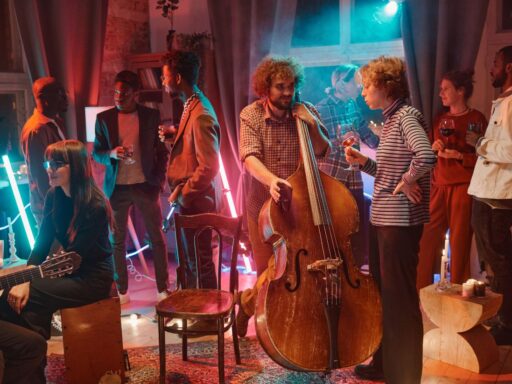So, you’ve rocked the open mic nights, and now you’re dreaming of something more… a regular gig. The clinking of glasses, the murmur of happy diners, and your music setting the perfect vibe. But let’s be real, landing restaurant gigs isn’t always a walk in the park. It’s a world of hustling, networking, and understanding that it’s about more than just playing your heart out.
This isn’t just another list of generic tips. Think of this as your roadmap, your backstage pass to navigating the restaurant scene. We’ll explore how the live music landscape is evolving and how you can position yourself to not just get a gig, but to create an experience.
Decoding the Venue: More Than Just a Stage

Let’s face it: a restaurant isn’t just a place to grab a bite; it’s an experience. And for musicians looking to make their mark, understanding this is key to landing restaurant gigs.
It’s about recognizing that you’re not just providing background music; you’re contributing to the entire atmosphere.
Immersing Yourself in the Atmosphere
Forget just showing up and setting up. To truly connect with a venue, you’ve got to become a patron yourself. I’m talking full-on experiential research! Visit the spot at different times – lunch, happy hour, dinner rush. Observe.
What’s the vibe? Is it a chill, after-work crowd unwinding with some craft brews? Or a more intimate setting with couples enjoying a quiet dinner?
For example, imagine the difference between a bustling happy hour with the energy of a Friday night, versus a quiet dinner service where conversations flow softly. The music needs to match that energy.
Know Your Crowd, Own the Room
This might seem obvious, but it goes beyond just knowing what people are eating. It’s about understanding who they are. Are we talking mostly Baby Boomers enjoying classic cocktails, or a Gen Z crowd snapping Insta-worthy food pics?
Think about it: Baby Boomers might groove to some smooth jazz or classic rock, while Gen Z might be looking for indie pop or acoustic covers of today’s hits.
But here’s the kicker: even with all the prep, you’ve got to be ready to read the room in real-time. If your carefully planned setlist isn’t hitting the mark, you’ve got to be flexible enough to switch gears and find what does.
The Venue’s Playlist: What’s Been Played Before?
Don’t just stalk their social media (though that helps!). Dig deeper. Check their website for past performers, look for local listings, or even chat with the staff. What kind of music do they usually feature?
This isn’t about copying; it’s about understanding their musical DNA. Knowing what’s worked before can help you tailor your pitch and avoid sounding like a broken record.
Aligning Your Brand with Theirs
Restaurants have a brand, just like you do. It’s in their décor, their menu, their service style. Your music needs to be a complementary piece of that puzzle.
Think of it this way: a rustic, farm-to-table spot probably isn’t the best fit for a heavy metal band. But a bluesy vibe? Now you’re talking.
It’s about enhancing the overall customer experience. When the music aligns with the venue’s brand, it creates a memorable night for the diners and makes you a valuable asset for landing restaurant gigs in the future.
Related Content: How To Nail Your Next Wedding Gig
Crafting a Pitch That Gets You Heard (and Hired)

Forget everything you know about sales-y pitches. When it comes to how to land a restaurant gig, think of it as starting a conversation, not delivering a hard sell. You’re not just trying to convince someone to hire you; you’re showing them how you can enhance their venue.
Your Musical DNA: Showcase Your Unique Sound
Ditch the generic “plays all genres” line. What’s your artistic DNA? What makes your music instantly recognizable? Are you a soulful crooner with a vintage vibe, or an energetic indie-folk band with infectious harmonies?
Your recordings and videos should reflect this. Don’t just send a random live performance; curate media that fits the venue’s style.
If you’re eyeing a trendy bistro, a slickly produced video of your acoustic set might be more effective than a shaky recording from a loud bar.
Experience That Speaks Volumes
Experience isn’t just about the number of gigs you’ve played; it’s about the quality of those experiences. Did you have a residency at a popular venue? Did you play a well-attended festival? Quantify your experience whenever possible.
And don’t underestimate the power of testimonials. A glowing review from a satisfied client is worth its weight in gold. If you’re just starting out, gather feedback from friends, family, or open mic organizers.
Beyond musical talent, highlight your transferable skills: Are you reliable? Professional? Easy to work with? These qualities are huge for venue owners.
Speak Their Language: Understanding Their Needs
Remember Section 1? All that venue research pays off here. Your pitch should demonstrate that you’ve done your homework and understand their specific needs.
Instead of a generic setlist, suggest a tailored setlist. “Based on my understanding of your clientele and the ambiance you’ve created, I’ve put together a sample setlist that includes…”
Address their potential concerns head-on: “I’m committed to punctuality, I’m happy to work with your sound technician, and I always ensure a professional and courteous demeanor.”
Making the Ask: Confidence, Clarity, and Call to Action
Your pitch should have a clear and confident “ask.” Don’t be wishy-washy.
For an email pitch, a compelling subject line is crucial. Instead of “Musician Available,” try something like “Elevate Your Thursday Nights with Live Acoustic Soul.”
End with a clear call to action: “I’d love to chat more about how I can bring my music to [Venue Name]. Are you available for a brief call next week?”
And about following up without being annoying: Send a polite follow-up email within a week if you haven’t heard back. Keep it brief and reiterate your interest. If you still don’t hear back, move on, but keep the contact in your network.
Building a Portfolio That Makes Them Say “Wow”

Think of your portfolio as your musical resume—a dynamic, living highlight reel designed to make venue owners sit up and take notice. It’s not just a collection of songs; it’s a carefully curated presentation of your talent, professionalism, and what you bring to the table when landing restaurant gigs.
Curating Your Greatest Hits (and Showing Your Range)
This is where you showcase your very best. Select recordings, both live and studio, that truly represent your musical prowess. But don’t just stick to one style! Demonstrate your versatility. If you can seamlessly transition from a soulful jazz ballad to an upbeat acoustic pop song, show it off!
The key here is variety. A diverse portfolio proves you can cater to different crowds and adapt to various restaurant atmospheres.
Beyond the Audio: Visuals That Captivate
In today’s visually driven world, audio alone won’t cut it. Invest in professional photos that capture your stage presence and personality. And high-quality video is non-negotiable.
Don’t just post static performance footage. Capture the energy of your live shows! Show the audience engaged, singing along, and having a great time. These visuals communicate your ability to connect with a crowd, which is a huge plus for venue owners.
For effective performance videos, consider these tips:
- Use multiple camera angles for a dynamic feel.
- Ensure clear audio and video quality.
- Keep it concise and engaging (highlight the best parts).
- Include shots of audience interaction.
Your Online Stage: Creating a Digital Presence
Your portfolio needs a home base. A simple, well-designed website or Electronic Press Kit (EPK) is essential. This is where you’ll host your recordings, videos, bio, testimonials, and contact information.
Optimize your social media profiles for professional use. Think of them as extensions of your portfolio. Share high-quality content, engage with your followers, and make it easy for venue owners to find your music and contact you.
Make sure your portfolio is easily shareable. Include links on your website, social media profiles, and in your email signature.
Keeping it Fresh: Updating Your Portfolio Regularly
Your portfolio isn’t a “set it and forget it” kind of thing. It needs to be a living document that evolves with your career.
Here’s why you should update it:
- Showcase your growth: New recordings and videos demonstrate your ongoing development as a musician.
- Stay relevant: Updating your repertoire keeps you current and appealing to a wider range of venues.
- Maintain professionalism: An outdated portfolio can give the impression that you’re not actively pursuing gigs.
Aim to update your portfolio at least every few months. Include:
- New recordings and videos
- Updated bio and photos
- Testimonials from recent gigs
- Any new accomplishments or milestones
Networking That Works: It’s Who You Know (and Who Knows You)

Let’s ditch the image of awkward handshakes and forced small talk. In the music world, networking is about building genuine relationships that can lead to incredible opportunities. It’s less about collecting contacts and more about connecting with people.
Turning Every Gig into a Networking Opportunity
Every time you step on a stage, regardless of whether it’s a packed stadium or a cozy corner in a restaurant, you’re networking. Be professional, be personable, and be someone people want to work with.
Engage with the venue staff – from the sound engineer to the manager. A little appreciation goes a long way. Chat with other performers; they might know about other gigs or be looking for collaborators. And don’t underestimate the power of connecting with the audience. After your set, stick around, talk to people, and thank them for coming.
The art of the follow-up is crucial. Send a thank-you note to the venue owner or event organizer. Stay in touch with people you connect with on social media. A simple “Hey, it was great meeting you last night!” can keep the relationship alive.
Where to Find Your Tribe: Industry Events and Online Communities
Beyond your gigs, seek out opportunities to connect with other musicians and industry professionals. Look for local music festivals, open mic nights, workshops, and seminars.
When you’re at these events, don’t just hand out business cards and disappear. Engage in meaningful conversations. Ask people about their experiences, their challenges, and their passions. Be genuinely interested, and you’ll make a lasting impression.
Online communities can also be a goldmine for networking. Find Facebook groups, online forums, and subreddits dedicated to local musicians. Participate in discussions, share your music, and connect with people who share your interests.
The Power of Collaboration: Expanding Your Reach
Collaborating with other musicians can open doors you never knew existed. When you collaborate with someone, you’re not just combining your talents; you’re also leveraging each other’s networks.
Think about it: If you team up with a local singer-songwriter, you’ll be exposed to their fans, and they’ll be exposed to yours. This cross-promotion can significantly expand your reach and introduce you to new venues and opportunities.
There are many examples of successful musical collaborations. Think of how a guest vocalist can elevate a track, or how two bands with different styles can create something truly unique.
Building Bridges Online: Social Media and Beyond
Social media is a powerful tool for networking, but it’s important to use it strategically.
Here are some of the best platforms for musicians:
- Instagram: For visual content, behind-the-scenes glimpses, and connecting with fans.
- Facebook: For creating events, building a community, and sharing longer updates.
- LinkedIn: For connecting with industry professionals and venue owners.
- Twitter: For quick updates, engaging in conversations, and sharing links.
Here’s how to use social media for networking:
- Be authentic: Share your personality and your passion for music.
- Engage with others: Don’t just broadcast your own content; comment on other people’s posts, ask questions, and participate in conversations.
- Provide value: Share helpful tips, insights, and resources related to music.
- Be consistent: Post regularly to stay top-of-mind.
And here are some crucial dos and don’ts of online networking:
- Do: Be professional, be respectful, and be responsive.
- Do: Personalize your messages and avoid generic greetings.
- Don’t: Spam people with your music or promotional materials.
- Don’t: Get involved in online drama or negativity.
- Don’t: Only reach out when you need something. Build the relationship.
The Encore: Following Up and Growing From Every Gig

Think of every gig as not just a performance, but as a crucial step in your musical journey. It’s a chance to learn, refine your craft, and build a foundation for future opportunities.
This section is about making the most of every single time you play, from the moment you step off stage to planning your long-term career. It’s about turning those restaurant gigs into stepping stones.
The Immediate Afterglow: Post-Performance Follow-Up
The moment your set ends, the work isn’t quite over. Take the time to connect with the venue owners or managers. Send a personalized thank-you note, whether it’s a quick email or a handwritten card. This small gesture shows your professionalism and appreciation.
Don’t be afraid to ask for feedback. “How did you feel the music fit the overall atmosphere?” “What was the audience response like?” This information is invaluable. Also, use this opportunity to express your interest in playing there again or exploring future possibilities. Building a positive rapport can lead to repeat bookings and referrals.
The Post-Mortem: Reflecting and Refining Your Craft
Every performance, good or bad, offers a chance to learn and grow. After the adrenaline fades, take some time for a detailed self-evaluation. What worked well? What didn’t? And most importantly, why?
If possible, record your performances. Watching yourself back can reveal things you might have missed in the moment. Combine this with the feedback you received to identify areas where you can improve.
It’s also crucial to develop a healthy relationship with criticism and rejection. Not every gig will be a home run, and you won’t get every booking you apply for. Learn to view these experiences as opportunities to learn and refine your approach, rather than as personal failures.
Turning Connections into Contracts: Maximizing Opportunities
Networking doesn’t end after the gig is over. Stay in touch with venue owners, event organizers, and other musicians you’ve connected with. Send occasional updates about your upcoming performances or new music.
Be proactive in seeking out new opportunities. Don’t just wait for gigs to come to you. Research potential venues, reach out to your network, and actively promote your services.
Ultimately, your goal is to build a reputation as a reliable, professional, and talented musician. This reputation will precede you and make it easier to secure future bookings.
The Long Game: Building a Sustainable Music Career
Playing in restaurants is often a part of a larger musical journey. It’s important to have a long-term vision for your career.
Start by setting clear, achievable goals. Do you want to play larger venues? Release an album? Tour? Once you have a vision, create a plan to achieve it. This plan might include things like:
- Improving your musical skills
- Building a strong online presence
- Expanding your network
- Saving money for recording or touring
The music industry can be challenging, so staying motivated and persistent is crucial. Celebrate your small victories, learn from your setbacks, and never give up on your dreams.
Also Read: Maximize Your Earnings: Expert Tips for Setting Higher Rates for Your Gigs
Conclusion
The journey to consistent restaurant gigs is a marathon, not a sprint. It demands persistence, a willingness to constantly improve, and a belief in your musical talent. Take these tips, make them your own, and start putting them into action.
The reward? It’s not just about the paycheck (though that’s nice, too). It’s about the energy of a room responding to your music, the joy of creating a memorable experience, and the satisfaction of building a sustainable career doing what you love. So, get out there, play your heart out, and make some music!






